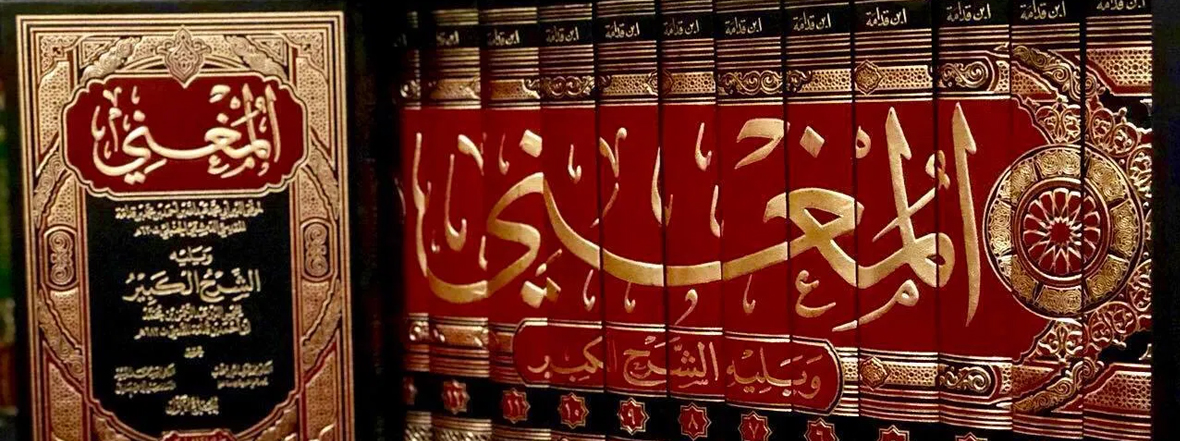For the benefit of the English-speakers, I wrote a bit about the history of the Hanbalī Madhhab and its relied upon works:
Imam Ahmad never authored a complete work on Fiqh, and this was because of his extreme wara’.
Some of his students wrote his Fiqh opinions and compiled it in the small books of “Masa’il”. The most famous of those who did this are: his two sons Abdullah & Sālih, Abu Dawud al-Sijistani (author of the Sunan), al-Kawsaj, Ibn Hani’, Hanbal, and others.
Imam al-Khallal came and compiled all of these small scattered works in one big book he called “al-Jami'” (lit. The Collection); this book is lost.
Imam al-Khiraqi came and using al-Khallal’s work made the first short treatise on Hanbalī Fiqh, famously known as “Mukhtasar al-Khiraqi”.
The most famous Sharh of Khiraqi is Ibn Qudāmah’s “Mughni”; a comprehensive work that discusses comparative Fiqh.
Then came Qadhi Abu Ya’la, who had some important works like “al-Riwayatan wal-Wajhyn”.
His student Abul-Khattab authored two works: “al-Hidayah”, and “Ru’us al-Masa’il”.
Imam Majd b. Taymiyyah (the grandfather) explained “al-Hidayah”; book is lost.
Benefit: Shaykhul-Islam Ibn Taymiyyah most likely had memorized both of Abdul-Khattab’s works, and this is clear from the way he quotes and uses the information within the book in his works.
Then came the two “Shaykhs” of the Hanbalī school: Majd b. Taymiyyah, and Ibn Qudāmah.
Ibn Qudāmah authored: “al-Umdah”, “al-Muqni'”, “al-Kafi”, and “al-Mughni” which we have already discussed.
The “Muqni'” is probably the most important work in Hanbalī history.
Majd b. Taymiyyah authored: “al-Muharrar”, and “Sharh al-Hidayah” which we have mentioned.
Then came Shaykhul-Islam Ibn Taymiyyah, who explained parts of Ibn Qudāmah’s “Umdah”, and his grandfather’s “Muharrar”. Both books are incomplete, and these is a disagreement if they are lost or he just didn’t finish them.
Then came his student Ibn Muflih (who memorized the Muqni’) and authored the famous volumous work on comparative Fiqh, “al-Furu'”.
Ibn Qudāmah’s “Muqni'” reached it’s peak at this time; it was explained, memorized, and put into poem format.
Al-Tanukhi, Ibn Abi Umar, and others from the teachers of Ibn Taymiyyah all had explanations of the “Muqni'”.
Ibn Muflih’s grandson also had a Sharh on the “Muqni'”.
Then came ‘Allamah al-Mirdawi, who authored an explanation on the Muqni’ in 12-volume work he named “al-Insaf”.
He also authored “al-Tanqih”, which he takes the issues in which Ibn Qudāmah mentioned a disagreement in the “Muqni'” and points out the relied-upon position; he also corrects and adds if needed.
The scholars saw the need to join between the original work (the Muqni’) and it’s explanation by al-Mirdawi; while taking out all the unnecessary information and adding a few things here and there.
Imam Ibn Najjar did this in his “Muntaha”, and joined between the “Muqni'” and “Tanqih”.
And Imam al-Hajjawi did something similar in “al-Iqna'” where he took the “Muqni'” and relied more upon the “Insaf”, and not as much on the “Tanqih”; which is why the “Muntaha” is usually preferred over the “Iqna'” if they disagree.
Al-Hajjawi also made a short book for beginners which he named “Zad al-Mustaqni'”, summarizing the “Muqni'” even further.
Then came Shaykh Mari’i al-Karmi, who joined between the “Muntaha” and “Iqna” in one book: “al-Ghayah”.
He also authored “Dalil al-Talib” for beginners, which relied on “Muntaha” according to one opinion.
Imam al-Balbani also came and wrote “Kafi al-Mubtadi” for beginners, relying more on the “Iqna”, then he summarized it in “Akhsar al-Mukhtasarat”.
Then Imam al-Buhuti explained the “Muntaha” in 7 volumes, the “Iqna'” in his comprehensive work “Kashāf al-Qina'”, and the “Zad” in his famous work “al-Rawd”.
He also authored a small book for beginners, which he made similar to the “Zad”, except he took out everything that went against the Madhhab, and reworded/reordered if anything was needed, and he named it “Umdatul-Talib”.
– Compiled by Muhammad Abdullah (via Facebook)




